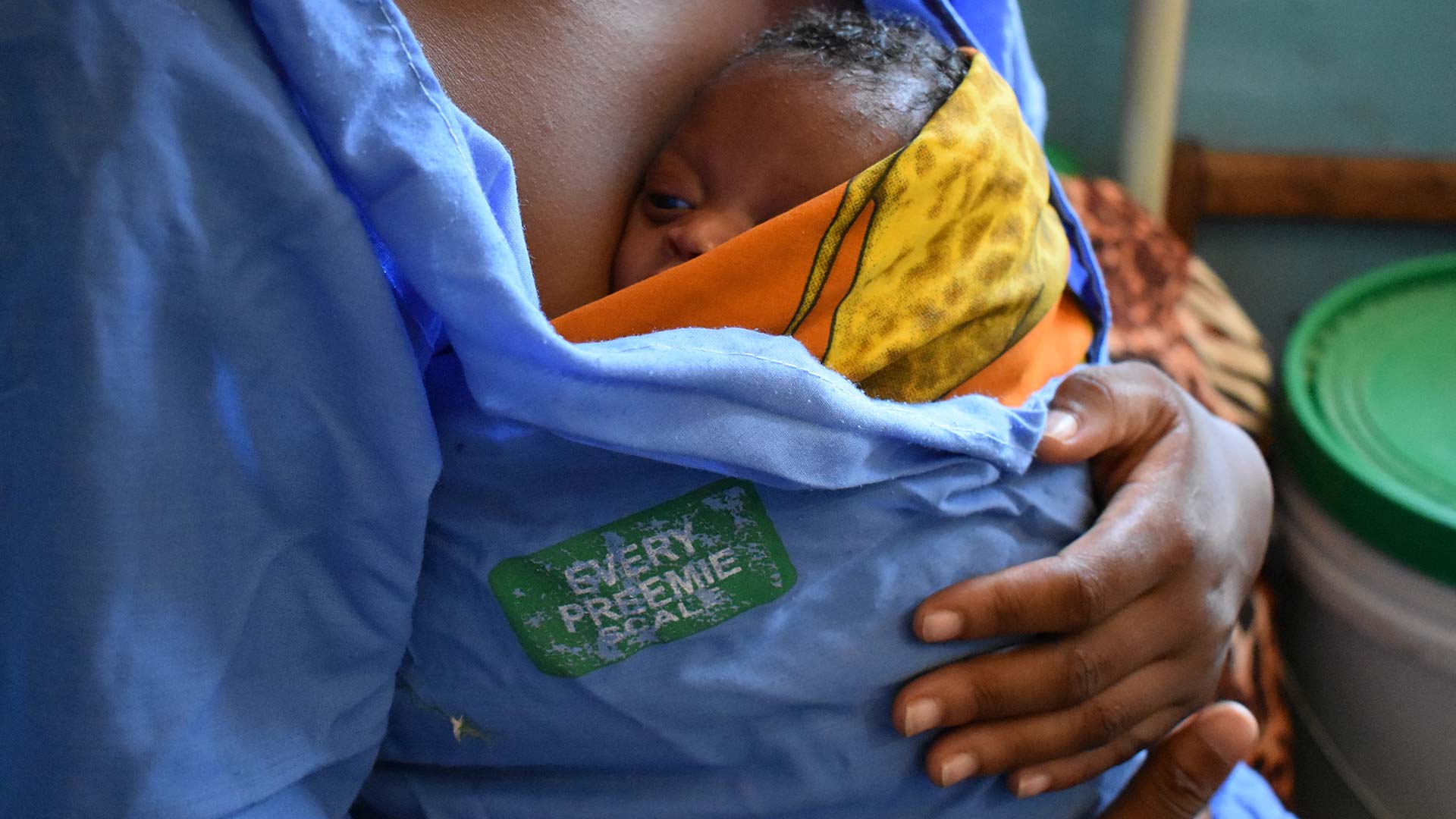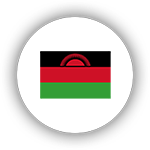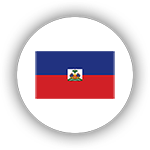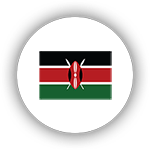It Takes a Village: Transforming Care for Early and Small Babies
Story/photos by Maureen Simpson
A mural painted on an outside wall of the Balaka District Hospital in Malawi has the following message translated in Chichewa: "Everyone can take care of a preterm baby."
Pictured with the declaration are three family members, presumably a grandmother, husband and wife. Each are shown holding a small, tightly wrapped newborn to their chest, skin-to-skin, using a practice known as Kangaroo Mother Care (KMC).
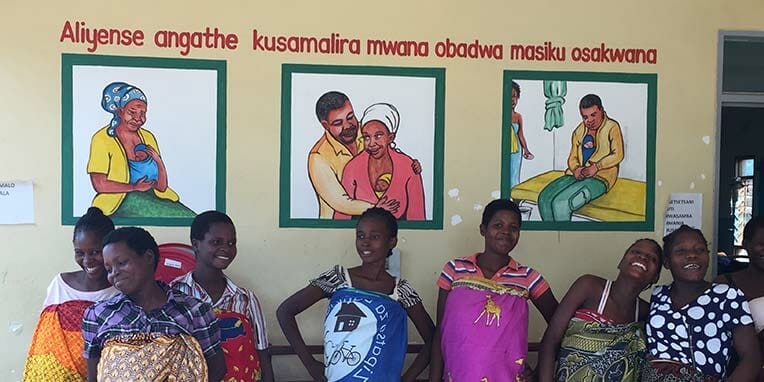
While the concrete display sounds simple, it's a concept that has transformed the way this facility cares for preterm/low birth weight (LBW) babies. With support from the U.S. Agency for International Development, technical assistance from PCI's Every Preemie-SCALE project (Every Preemie) and in partnership with the Malawi Ministry of Health, Balaka District Hospital and eight health centers have implemented the Family-Led Care model.
Family-Led Care empowers caregivers of all kinds to confidently address the unique needs of early/small babies - in the hospital and at home. At the facility level, that means ensuring mothers and their preterm/LBW newborns receive immediate specialized care and continuous monitoring after delivery.
"Before this project, it just felt like we were taking care of these babies haphazardly," said Annie Nkosi, a nurse midwife at Balaka District Hospital who also serves as the KMC Coordinator for Every Preemie. "There was no isolation of premature babies, no real documentation and no storage of case notes. Every baby was managed the same, regardless of their condition."
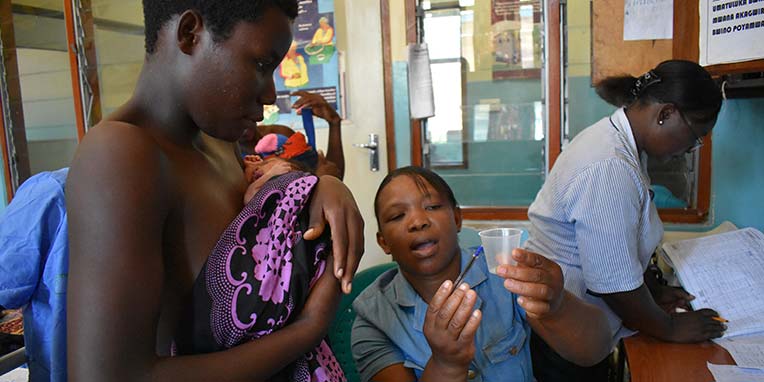
In a country with one of the highest preterm birth rates in the world, Nkosi said it wasn't a lack of concern or awareness behind this response, but instead a lack of resources.
"In the unit, there is typically only one nurse caring for sick babies and premature babies. So, it was very hard for them to care for a postnatal mom and to also care for a premature baby. The workload was too great," Nkosi explained. "With the coming of this project and the Family-Led Care model, we are working now like a team."
Much like the Family-Led Care model involves counseling fathers, grandparents and other relatives on how they can support the mother in providing KMC, Every Preemie trained participating health facilities' staff to help meet a dire need. Nearly 50 nurses, clinicians, medical assistants and support staff across nine health facilities in Balaka district now have the necessary skills to both care for and educate families coping with early and small babies.
One such staff member is Sellina Mwenyedini, a hospital attendant whose primary job is cleaning the facility. After mopping and dusting the hospital and tending to other errands, she now adds KMC rounds to her shift.
"It is very painful for a mother to deliver a baby and then that baby dies. That is why I try my best to go there and help these mothers," said Mwenyedini, who has learned how to counsel mothers on breastfeeding, skin-to-skin contact and monitoring their babies for danger signs.
"I get satisfied when I see that I've helped a mother with a baby and the baby has grown well and they are discharged," she said. "When we meet at gatherings in the community, mothers will come to show their babies to me and say, 'See your child now! She is growing well. She is big.' I feel good knowing that I have done something valuable here."

Sevelina Chikanda has worked as a patient attendant at Balaka District Hospital for 29 years, before the facility even had a KMC ward. Since receiving training from Every Preemie and helping the hospital to implement Family-Led Care, she has noticed a major shift in how mothers, fathers, caregivers and other community members perceive preterm/LBW newborns.
"There is more hope now. The babies are surviving," Chikanda said. "… Because of the counseling and the experience they've had here, mothers are able to tell other mothers who have given birth to preterm babies in the community that they should come here. They know we can help."

Pathways to Resilience: Transforming food security in Malawi
Story by Melissa Silverman
Photos by Simwaka Malumbo
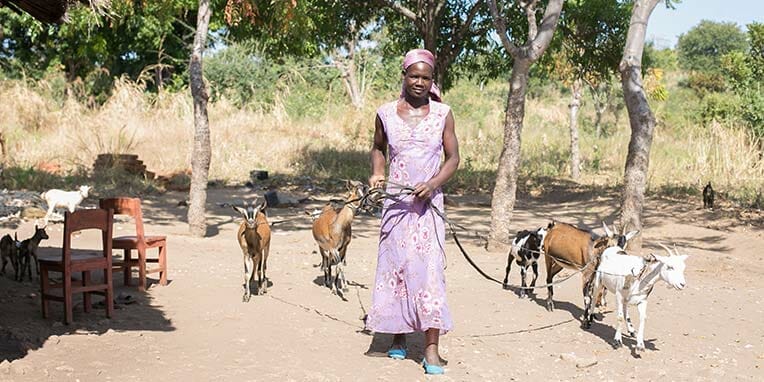
Malawi's countryside is populated by subsistence farmers, families who are deeply vulnerable to food insecurity, especially in a changing climate where unexpected weather patterns and other shocks can disrupt the growing season. To transform these communities and build resilient, sustainable sources of food and nutrition, PCI worked with the U.S. Agency for International Development's Food for Peace Office to design and implement an innovative, integrated strategy in two districts in southern Malawi.
"Lack of food is a story of the past for me and my family," said Bertha Banda, a mother of four and program participant. "I did not know livestock would turn my life around."
Banda is one of 51 people to become a Community Animal Health Worker (CAHW) through a PCI project focused on helping farmers and individuals like Banda find better ways to increase their food production, earn a steady income and improve their nutrition. Enhancing the availability of high-quality, healthy livestock is just one component of the project, but Banda and her cohort of trained professionals have proven how animals like chickens, goats and pigeons can be a lifeline, transforming a family's options for food sources and income generation.
As part of a three-week CAHW training and certification program, Banda learned how to diagnose and treat common animal diseases, house and market livestock, and improve animal breeding practices. Each month, her new job takes her to an average of 300 households in areas where professional veterinary care is not available. By ensuring the well-being of local livestock, Banda has found both a profitable calling and a way to safeguard the livelihoods of fellow community members.
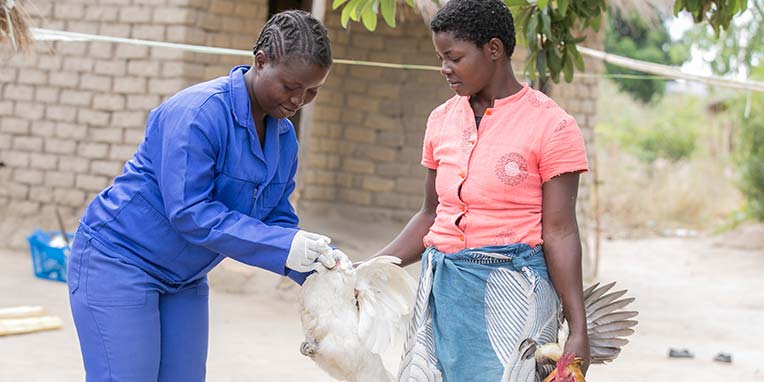
In 2019, CAHWs vaccinated 281,882 chickens and dewormed 10,294 goats in the Balaka and Machinga districts of Malawi. The project also provided 6,105 families with livestock to improve their food security and economic opportunity. By establishing an animal "pass-on" donation program, this number grew to a total of 17,557 individuals benefiting from livestock support.
Not only do CAHWs attend to the medical needs of the livestock, they also ensure that the owners build proper housing for their livestock and verify the age and health of the animals. Some CAHWs even train farmers to assist with preliminary diagnoses and to offer advice to livestock owners.
Another CAHW, 32-year-old Jackson Issa, said the program "has been life changing for me, because not only have I gained skills and technical knowledge, but I also make money that enables me to sustain my household." In thanking PCI and project partners, Issa said, "They never gave up on me. Now I am a successful CAHW and my plan is to open a veterinary shop which will enable me to reach more farmers beyond my community."
